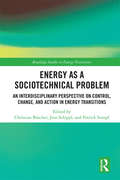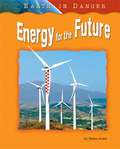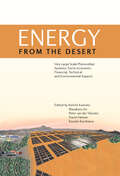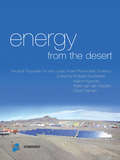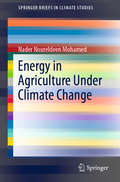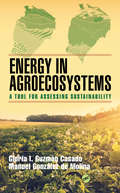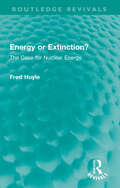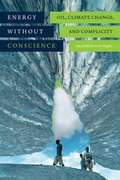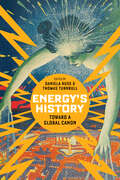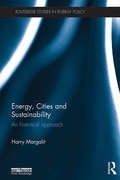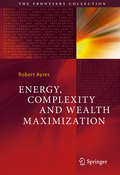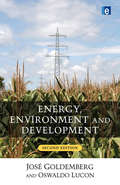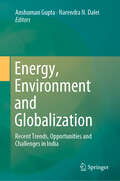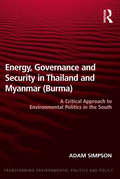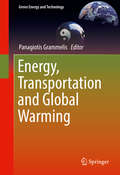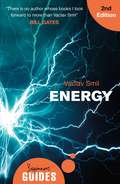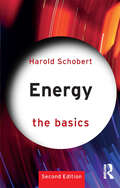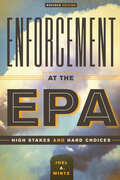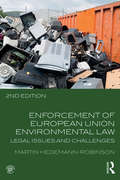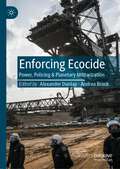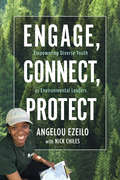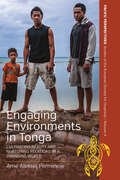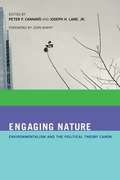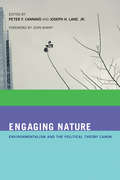- Table View
- List View
Energy as a Sociotechnical Problem: An Interdisciplinary Perspective on Control, Change, and Action in Energy Transitions (Routledge Studies in Energy Transitions)
by Christian Büscher Patrick Sumpf Jens SchipplEnergy as a Sociotechnical Problem offers an innovative approach to equip interdisciplinary research on sociotechnical transitions with coherence and focus. The book emphasizes sociotechnical problems in three analytical dimensions: - In the control dimension, contributing authors examine how control can be maintained despite increasing complexity and uncertainty, e.g., in power grid operations or on energy markets; - In the change dimension, the authors explore if and how change is possible despite the need for stable orientation, e.g., regarding discourses, real-world labs and learning; - Finally, in the action dimension, the authors analyze how the ability to act on a permanent basis is sustained despite opaqueness and ignorance, exemplified by the work on trust, capabilities or individual motives. Drawing on contributions from engineering, economics, philosophy, political science, psychology and sociology, the book assembles a range of classic and current themes including innovation, resilience, institutional economics, design or education. Energy as a Sociotechnical Problem presents the ongoing transformation of the energy complex as a multidimensional process, in which the analytical dimensions interact with each other in shaping the energy future. As such, this book will be of great interest to students and scholars of energy transitions, energy science and environmental social science more generally, as well as to practitioners working within the field of energy policy.
Energy for the Future (Earth in Danger)
by Helen OrmeBurning fossil fuels, such as oil and coal, may be accelerating Earth's climate change. How can we develop clean, renewable sources of energy and reduce our dependence on fossil fuels? Energy for the Future clearly presents the pros and cons of alternative energy sources-- from wind, water, and solar power to bio-fuels, hydrogen fuel cells, and nuclear power. A section in the back of the book will inspire young environmentalists by suggesting ways they can help protect their planet.
Energy from the Desert: Feasibility of Very Large Scale Photvoltaic Power Generation Systems & Practical Proposals for Very Large Scale Photovoltaic Systems
by Keiichi Komoto David Faiman Masakazu Ito Peter van der Vleuten Kosuke KurokawaThe world's deserts are sufficiently large that, in theory, covering a fraction of their landmass with PV systems could generate many times the current primary global energy supply. The Energy from the Desert two-volume set details the background and concept of Very Large Scale Photovoltaics (VLS-PC) and examines and evaluates their potential as viable power generation systems. The authors present case studies of both virtual and real projects based on selected regions (including the Mediterranean, Sahara, Chinese Gobi, Mongolian Gobi, Indian Thar, Australian Desert and the US) and their specific socio-economic dynamics, and argue that VLS-PV systems in desert areas will be readily achievable in the near future.
Energy from the Desert: Practical Proposals for Very Large Scale Photovoltaic Systems
by Keiichi Komoto David Faiman Peter van der Vleuten Kosuke KurokawaThe world's deserts are sufficiently large that, in theory, covering a fraction of their landmass with PV systems could generate many times the current primary global energy supply. In three parts, this study details the background and concept of VLS-PV, maps out a development path towards the realization of VLS-PV systems and provides firm recommendations to achieve long-term targets. This represents the first study to provide a concrete set of answers to the questions that must be addressed in order to secure and exploit the potential for VLS-PV technology and its global benefits.
Energy in Agriculture Under Climate Change (SpringerBriefs in Climate Studies)
by Nader Noureldeen MohamedThis book discusses the role of energy in agriculture which reaches 30%, and the role of agriculture in energy where the water shred by 17% in total electricity generation in addition to the role of bioenergy as a source of liquid energy. Climate change and global heating will increase the temperature and that will affect plant growth, water availability and the share of electricity in agriculture and other energy phases in agriculture. Global heating means more water pumping, more uses of fertilizers and pesticides in which intensive power consumption in addition to need of more electricity for air-condition inside the greenhouses, the manufacturing of hormone and plant growth organizers will also consume more energy. Finally, the book explains why the water, energy and food become one nexus and the interaction and interference between them.This book will have valuable information for both students and faculties of engineering and agriculture in addition to research centers, water institutions and climate change specialists.
Energy in Agroecosystems: A Tool for Assessing Sustainability (Advances in Agroecology)
by Gloria I. Casado Manuel Gonzalez de MolinaEnergy in Agroecosystems: A Tool for Assessing Sustainability is the first book on energy analysis that is up-to-date and specifically dedicated to agriculture. It is written from an agroecological perspective and goes beyond the conventional analysis of the efficient use of energy. The book provide a methodological guide to assess energy efficiency and sustainability from an eco-energetic point of view. <P><P> Case studies from both Europe and America, which are representative of today’s most used scales of analysis (crop, farm, local or national) and the different farm management practices (traditional, industrialized, and contemporary organic), apply this methodology This book will be of primary interest to researchers, practitioners, and students working in the areas of agroecology, sustainable agriculture, environmental science, energy analysis, natural resources management, rural development and international development.
Energy or Extinction?: The Case for Nuclear Energy (Routledge Revivals)
by Fred HoyleOriginally published in 1977 and as second edition in 1979, this book argues that without energy sources on a vast scale our present society cannot survive. According to the author, Fred Hoyle, the technology to tap solar, wind or wave power on a large enough scale just does not exist. He considers nuclear fission to be the only source currently capable of supplying our needs. The author fills in the scientific background necessary to appreciate his arguments in his lucid, direct style, so that the book can act as an ideal introduction for those unfamiliar with the energy debate. This short book is unashamedly provocative and many of the central tenets of it remain as relevant today as when it was first published.
Energy without Conscience: Oil, Climate Change, and Complicity
by David Mcdermott HughesIn Energy without Conscience David McDermott Hughes investigates why climate change has yet to be seen as a moral issue. He examines the forces that render the use of fossil fuels ordinary and therefore exempt from ethical evaluation. Hughes centers his analysis on Trinidad and Tobago, which is the world's oldest petro-state, having drilled the first continuously producing oil well in 1866. Marrying historical research with interviews with Trinidadian petroleum scientists, policymakers, technicians, and managers, he draws parallels between Trinidad's eighteenth- and nineteenth-century slave labor energy economy and its contemporary oil industry. Hughes shows how both forms of energy rely upon a complicity that absolves producers and consumers from acknowledging the immoral nature of each. He passionately argues that like slavery, producing oil is a moral choice and that oil is at its most dangerous when it is accepted as an ordinary part of everyday life. Only by rejecting arguments that oil is economically, politically, and technologically necessary, and by acknowledging our complicity in an immoral system, can we stem the damage being done to the planet.
Energy's History: Toward a Global Canon
by Daniela Russ and Thomas TurnbullEnergy history is an approach to understanding the past that takes changes in the human exploitation of Earth's energies as its object of inquiry. This interdisciplinary field documents and analyzes how humans have thought about, harnessed, stored, and exploited stocks and flows of energy. In recent decades, in response to evidence of the effect of fossil fuel use in our climatic system and coinciding with an energy turn across the humanities, a new urgency and purpose has been ascribed to such work. Energy's History challenges abstract and universalizing conceptions of energy's history-making capacities. Each of the twelve essays in this collection presents, analyzes, and contextualizes a primary source. The contributors focus on ideas, events, and statements that recorded and critiqued the distinct historical paths of energy, thereby broadening the scope of where and what constitutes energy history. As energy's world-making has enmeshed ever more of the planet into a dangerous compact with fossil fuels, energy histories must be revised within this new energy-historical reality. This volume both presents persuasive visions of energy-driven development beyond the Western capitalist model and provides an expansive and critical account of the ways in which energy histories have shaped the past and impact the present.
Energy, Cities and Sustainability: An historical approach (Routledge Studies in Energy Policy)
by Harry MargalitAccording to some estimates, humanity has now passed the point at which city dwellers outnumber country dwellers. This simple fact encapsulates a multitude of historical trends and contentions, not the least being "is this sustainable"? Energy, Cities and Sustainability aims to illuminate this question by tracing the evolution of the modern city, the energy sources that power it and the motivations behind increasing urbanisation. The book examines changing energy use across history, analysing the origins and significance of the Industrial Revolution to reveal how the modern city came into being. Transport, population size, housing, electricity use and growing consumption are each discussed, showing how the cultural aspects of energy use have influenced urban form in the developed world and developing countries. Finally, in contemplating the future, it is considered whether this model of modern urban life is sustainable. This book is a valuable resource for researchers, academics and policy-makers in the areas of planning, energy policy and environment and sustainability.
Energy, Complexity and Wealth Maximization
by Robert AyresThis book describes the evolution and mechanisms of natural wealth creation. The author explains how natural wealth consists of complex physical structures of condensed ("frozen") energy and what the key requirements for wealth creation are, namely a change agent, a selection mechanism and a life-extending mechanism. He uses elements from multiple disciplines, from physics to biology to economics to illustrate this. Human wealth is ultimately based on natural wealth, as materials transform into useful artifacts, and as useful information is transmitted by those artifacts when activated by energy. The question is if the new immaterial wealth of ideas of the knowledge economy can replace depleted natural wealth. This book reveals the vital challenge for economic and political leaders to explore how knowledge and natural capital, energy in particular, can interact to power the human wealth engine in the future.
Energy, Environment and Development
by Jose Goldemberg Oswaldo LuconThe relationship between energy and the environment has been the basis of many studies over the years, as has the relationship between energy and development, yet both of these approaches may produce distortions. In the first edition of this book, Professor Goldemberg pioneered the study of all three elements in relation to one another. With contributions from Oswaldo Lucon, this second edition has been expanded and updated to cover how energy is related to the major challenges of sustainability faced by the world today. The book starts by conceptualizing energy, and then relates it to human activities, to existing natural resources and to development indicators. It then covers the main environmental problems, their causes and possible solutions. Disaggregating national populations by income and by how different income groups consume energy, the authors identify the differences between local, regional and global environmental impacts, and can thus ascertain who is responsible for them. Finally, they discuss general and specific policies to promote sustainable development in energy. New coverage is included of today's pressing issues, including security, environmental impact assessment and future climate change/renewable energy regimes. The authors also cover all major new international agreements and technological developments. Energy, Environment and Development is the result of many years of study and practical experience in policy formulation, discussion and implementation in these fields by the authors. Written in a technical yet accessible style, the book is aimed at students on a range of courses, as well as non-energy specialists who desire an overview of recent thought in the area.
Energy, Environment and Globalization: Recent Trends, Opportunities and Challenges in India
by Anshuman Gupta Narendra N. DaleiThis book analyzes contemporary issues relating to energy, environment, and globalization in the Indian context. As a signatory to the Paris climate accord, India has reiterated its commitment to taking strong and positive steps toward climate change mitigation. However, as one of the fastest growing economies in the world, it is battling the effects of a steep rise in fossil fuel usage and pollution. Further, increasing globalization is leading to greater economic activity and production, resulting in additional energy use, which has a negative effect on the environment. The book argues that globalization need not have only a negative environmental impact; it can also have positive impact through the importation of environmentally sound technologies and implementing global compliance standards. The book is divided into three sections: The energy section discusses issues relating to the status of Indian natural gas market and the need for developing an efficient gas market in India; the economics and politics of sustainable energy in India; the challenges of thermal power and significance of clean thermal power generation in India; environmental and policy issues concerning energy use in urban India; the importance of energy use in developing Human Development Index (HDI); and issues relating to renewable energy in India. The environment section then examines topics such as the impact of global warming on local weather by examining the frequency of extreme weather events such as drought and floods, and their impact on farming activities in the Indian state of Odisha; the importance of according the economic value to environmentally significant things like national park , mangroves, etc. for sustainable development; the role of environmental accounting for ecological sustainability and ecotourism; and environmental concerns increasingly gaining traction among the corporate sector for their long-run benefits . Lastly, the third section addresses issues relating to the challenges and opportunities of globalization, such as the interface between globalization and environment; managing India’s business interest in proposing new Bilateral Investment Treaty (BIT); the challenges being faced by Indian exports and their revival; and making Indian SMEs competitive. As such, it is an invaluable resource for policymakers, researchers, practitioners and students in the field of energy, environment and trade economics.
Energy, Governance and Security in Thailand and Myanmar: A Critical Approach to Environmental Politics in the South (Transforming Environmental Politics and Policy #137)
by Adam SimpsonAcross the world states are seeking out new and secure supplies of energy but this search is manifesting itself most visibly in Asia where rapid industrialisation in states such as China and India is fomenting a frantic scramble for energy resources. Due to entrenched societal inequities and widespread authoritarian governance, however, the pursuit of national energy security through transnational energy projects has resulted in devastating impacts on the human and environmental security of local populations. These effects are particularly evident in both Thailand and Myanmar (Burma), which, located at the crossroads of Asia, are increasingly engaged in the cross-border energy trade. Based on extensive fieldwork and theoretical analysis this ground-breaking book proposes a new critical approach to energy and environmental security and explores the important role that both local and transnational environmental movements are playing, in the absence of effective and democratic governments, in providing ’activist environmental governance’ for energy projects throughout the region. By comparing the nature of this activism under two very different political regimes it delivers crucial theoretical insights with both academic and policy implications for the sustainable and equitable development of the South’s natural resources.
Energy, Transportation and Global Warming
by Panagiotis GrammelisThis book presents a holistic view of climate change by examining a number of energy and transportation technologies and their impact on the climate. High-quality technical research results from specific test-cases around the globe are presented, and developments in global warming are discussed, focusing on current emissions policies from air and maritime transport to fossil fuel applications. Novel technologies such as carbon capture and storage are investigated together with the corresponding process and systems analysis, as well as optimization for mitigating CO2 emissions. Water resources management, waste water treatment, and waste management issues are also covered. Finally, biomass, hydrogen and solar energy applications are presented along with some insights on green buildings. Energy, Transportation and Global Warming is of great interest to researchers in the field of renewable and green energy as well as professionals in climate change management, the transportation sector, and environmental policy.
Energy: A Beginner's Guide (Beginner's Guides)
by Vaclav SmilWith one famous equation, E=mc2, Einstein proved all matter can be described as energy. It is everywhere and it is everything. In this newly updated and engaging introduction, renowned scientist Vaclav Smil explores energy in all its facets – from the inner workings of the human body to what we eat, the car we drive and the race for more efficient and eco-friendly fuels. Energy: A Beginner's Guide highlights the importance of energy in both past and present societies, by shedding light on the science behind global warming and efforts to prevent it, and by revealing how our daily decisions affect energy consumption. Whether you're looking for dinner table conversation or to further your own understanding, this book will amaze and inform, uncovering the truths and exposing the myths behind one of the most important concepts in our universe.
Energy: The Basics (The Basics)
by Harold SchobertEnergy: The Basics offers a concise and engaging introduction to energy, answering critical questions and providing accessible definitions of essential concepts and developments in the field.People rarely stop to think about where the energy they use to power their everyday lives comes from and when they do it is often to ask a worried question: is mankind’s energy usage killing the planet? How do we deal with nuclear waste? What happens when the oil runs out? Energy: The Basics answers these questions, but it also does much more. In this engaging yet even-handed introduction, readers are introduced to: the concept of ‘energy’ and what it really means the ways energy is currently generated and the sources used new and emerging energy technologies such as solar power and biofuels the impacts of energy use on the environment including climate change This new edition has been updated throughout and includes a new chapter on energy storage, along with new material on transportation energy and batteries.Featuring explanatory diagrams and an extensive further reading list, this book is the ideal starting point for anyone interested in the impact and future of the world’s energy supply.
Enforcement at the EPA: High Stakes and Hard Choices, Revised Edition
by Joel A. MintzThe only published work that treats the historical evolution of EPA enforcement, this book provides a candid inside glimpse of a crucial aspect of the work of an important federal agency. Based on 190 personal interviews with present and former enforcement officials at EPA, the U.S. Department of Justice, and key congressional staff members—along with extensive research among EPA documents and secondary sources—the book vividly recounts the often tumultuous history of EPA’s enforcement program. It also analyzes some important questions regarding EPA’s institutional relationships and the Agency’s working environment. This revised and updated edition adds substantial new chapters examining EPA enforcement during the Clinton and George W. Bush administrations. Its treatment of issues of civil service decline and the applicability of captive agency theory is also new and original.
Enforcement at the EPA: High Stakes and Hard Choices, Revised Edition
by Joel A. MintzA former EPA chief attorney traces the tumultuous history of the agency&’s enforcement efforts from the Nixon through the second Bush administrations. Based on 190 personal interviews with present and former enforcement officials at EPA, the U.S. Department of Justice, and key congressional staff members—along with extensive research among EPA documents and secondary sources—this book vividly recounts the often-tumultuous history of EPA&’s enforcement program. It also analyzes some important questions regarding EPA&’s institutional relationships and the Agency&’s working environment. This revised and updated edition adds substantial new chapters examining EPA enforcement during the Clinton and George W. Bush administrations. Its treatment of issues of civil service decline and the applicability of captive agency theory is also new and original. The first published work to treat the historical evolution of EPA enforcement, this book provides a candid inside glimpse of a crucial aspect of the work of an important federal agency. &“Explores the agency&’s strengths and weaknesses . . . With insight and intimate knowledge of enforcement and compliance, Mintz relates an interesting story.&” —Ecology Law Quarterly
Enforcement of European Union Environmental Law: Legal Issues and Challenges
by Martin Hedemann-RobinsonOffering a detailed account of the various legal arrangements at European Union level, this book is an ideal reference tool for practitioners and legal scholars. As well as examining the principal sources of EU environmental law enforcement, it also contributes to the legal and political debates that surround the subject. Spanning three parts, the author examines the practical impact of the legal arrangements at Union level that are used to uphold EU environmental norms. Offering a comprehensive account of the current state of EU environmental law enforcement and the developments affecting it, Martin Hedemann-Robinson explores the role of the European Commission, the possibilities for private law enforcement, and the responsibilities of member state national authorities. Key legal developments that have occurred since the first edition have been incorporated, including new statutory developments and case law. Particular attention is paid to the impact of the 2007 Lisbon Treaty on foundational EU treaty provisions enabling the European Commission to take legal action against EU member states infringing Union environmental law, the establishment of a new legal architecture at Union level on the topic of environmental criminal policy, as well as increased EU legislative intervention in the area of environmental inspections. The impact of the 1998 Århus Convention on EU environmental law enforcement is also addressed in detail, including the influence of recommendations of the Århus Convention’s Compliance Committee.
Enforcing Ecocide: Power, Policing & Planetary Militarization
by Alexander Dunlap Andrea BrockPolicing and ecological crises – and all the inequalities, discrimination, and violence they entail – are pressing contemporary problems. Ecological degradation, biodiversity loss, and climate change threaten local communities and ecosystems, and, cumulatively, the planet as a whole. Police brutality, wars, paramilitarism, private security operations, and securitization more widely impact people – especially people of colour – and habitats. This edited collection explores their relationship, and investigates the numerous ways in which police, security, and military forces intersect with, reinforce, and facilitate ecological and climate catastrophe. Employing a case study-based approach, the book examines the relationships and entanglements between policing and ecosystems, revealing the intimate connection between political violence and ecological degradation.
Engage, Connect, Protect: Empowering Diverse Youth as Environmental Leaders
by Nick Chiles Angelou Ezeilo“Ezeilo artfully articulates the obscured problem of racism in the country’s environmental movement and unapologetically sets forth solutions.” —Elaine Brown, author of A Taste of PowerRevealing the deep and abiding interest that African American, Latino, and Native American communities—many of whom live in degraded and polluted parts of the country—have in our collective environment, Engage, Connect, Protect is part eye-opening critique of the cultural divide in environmentalism, part biography of a leading social entrepreneur, and part practical toolkit for engaging diverse youth. It covers:Why communities of color are largely unrecognized in the environmental movementHow to bridge the cultural divide and activate a new generation of environmental stewardsA curriculum for engaging diverse youth and young adults through culturally appropriate methods and activitiesResources for connecting mainstream America to organizations working with diverse youth within environmental projects, training, and employmentEngage, Connect, Protect is a wake-up call for businesses, activists, educators, and policymakers to recognize the work of grassroots activists in diverse communities and create opportunities for engaging with diverse youth as the next generation of environmental stewards, while the concern about the state of our land, air, and water continues to grow.“An accessible guide to respond to the inequities faced by persons of color marginalized by mainstream environmentalism.” —Dianne D. Glave, author of Rooted in the Earth“Highlights the cultural connection to nature that black and brown people have always had, and the need, for the sake of our physical, mental, and spiritual health, for it to be reclaimed.” —Kamilah Martin, Vice President at the Jane Goodall Institute
Engaging Environments in Tonga: Cultivating Beauty and Nurturing Relations in a Changing World (Pacific Perspectives: Studies of the European Society for Oceanists #9)
by Arne Aleksej PerminowOn March 11, 2011, a tsunami warning was issued for Tonga in Polynesia. On the low and small island of Kotu, people were unperturbed in the face of impending catastrophe. The book starts out from the puzzle of peoples’ responses and reactions to this warning as well as their attitudes to a gradual rise of sea level and questions why people seemed so unconcerned about this and the accompanying loss of land. The book is an ethnography of the relationship between people and their environment based on fieldwork over three decades.
Engaging Nature
by Peter F. Cannavò John Barry Joseph H. Lane Jr.Contemporary environmental political theory considers the implications of the environmental crisis for such political concepts as rights, citizenship, justice, democracy, the state, race, class, and gender. As the field has matured, scholars have begun to explore connections between Green Theory and such canonical political thinkers as Plato, Machiavelli, Locke, and Marx. The essays in this volume put important figures from the political theory canon in dialogue with current environmental political theory. It is the first comprehensive volume to bring the insights of Green Theory to bear in reinterpreting these canonical theorists.Individual essays cover such classical figures in Western thought as Aristotle, Hume, Rousseau, Mill, and Burke, but they also depart from the traditional canon to consider Mary Wollstonecraft, W. E. B. Du Bois, Hannah Arendt, and Confucius. Engaging and accessible, the essays also offer original and innovative interpretations that often challenge standard readings of these thinkers. In examining and explicating how these great thinkers of the past viewed the natural world and our relationship with nature, the essays also illuminate our current environmental predicament.Essays onPlato Aristotle Niccolò Machiavelli Thomas Hobbes John Locke David Hume Jean-Jacques Rousseau Edmund Burke Mary Wollstonecraft John Stuart Mill Karl Marx W. E. B. Du Bois Martin Heidegger Hannah Arendt Confucius ContributorsSheryl D. Breen, W. Scott Cameron, Peter F. Cannavò, Joel Jay Kassiola, Joseph H. Lane Jr. Timothy W. Luke, John M. Meyer, Özgüç Orhan, Barbara K. Seeber, Francisco Seijo, Kimberly K. Smith, Piers H. G. Stephens, Zev Trachtenberg, Andrew Valls, Harlan Wilson
Engaging Nature: Environmentalism and the Political Theory Canon (The\mit Press Ser.)
by Jr. Lane Peter F. Cannavò John Barry Joseph H.Essays that put noted political thinkers of the past—including Plato, Machiavelli, Hobbes, Wollstonecraft, Marx, and Confucius—in dialogue with current environmental political theory.Contemporary environmental political theory considers the implications of the environmental crisis for such political concepts as rights, citizenship, justice, democracy, the state, race, class, and gender. As the field has matured, scholars have begun to explore connections between Green Theory and such canonical political thinkers as Plato, Machiavelli, Locke, and Marx. The essays in this volume put important figures from the political theory canon in dialogue with current environmental political theory. It is the first comprehensive volume to bring the insights of Green Theory to bear in reinterpreting these canonical theorists.Individual essays cover such classical figures in Western thought as Aristotle, Hume, Rousseau, Mill, and Burke, but they also depart from the traditional canon to consider Mary Wollstonecraft, W. E. B. Du Bois, Hannah Arendt, and Confucius. Engaging and accessible, the essays also offer original and innovative interpretations that often challenge standard readings of these thinkers. In examining and explicating how these great thinkers of the past viewed the natural world and our relationship with nature, the essays also illuminate our current environmental predicament.Essays onPlato • Aristotle • Niccolò Machiavelli • Thomas Hobbes • John Locke • David Hume • Jean-Jacques Rousseau • Edmund Burke • Mary Wollstonecraft • John Stuart Mill • Karl Marx • W. E. B. Du Bois • Martin Heidegger • Hannah Arendt • Confucius ContributorsSheryl D. Breen, W. Scott Cameron, Peter F. Cannavò, Joel Jay Kassiola, Joseph H. Lane Jr. Timothy W. Luke, John M. Meyer, Özgüç Orhan, Barbara K. Seeber, Francisco Seijo, Kimberly K. Smith, Piers H. G. Stephens, Zev Trachtenberg, Andrew Valls, Harlan Wilson
